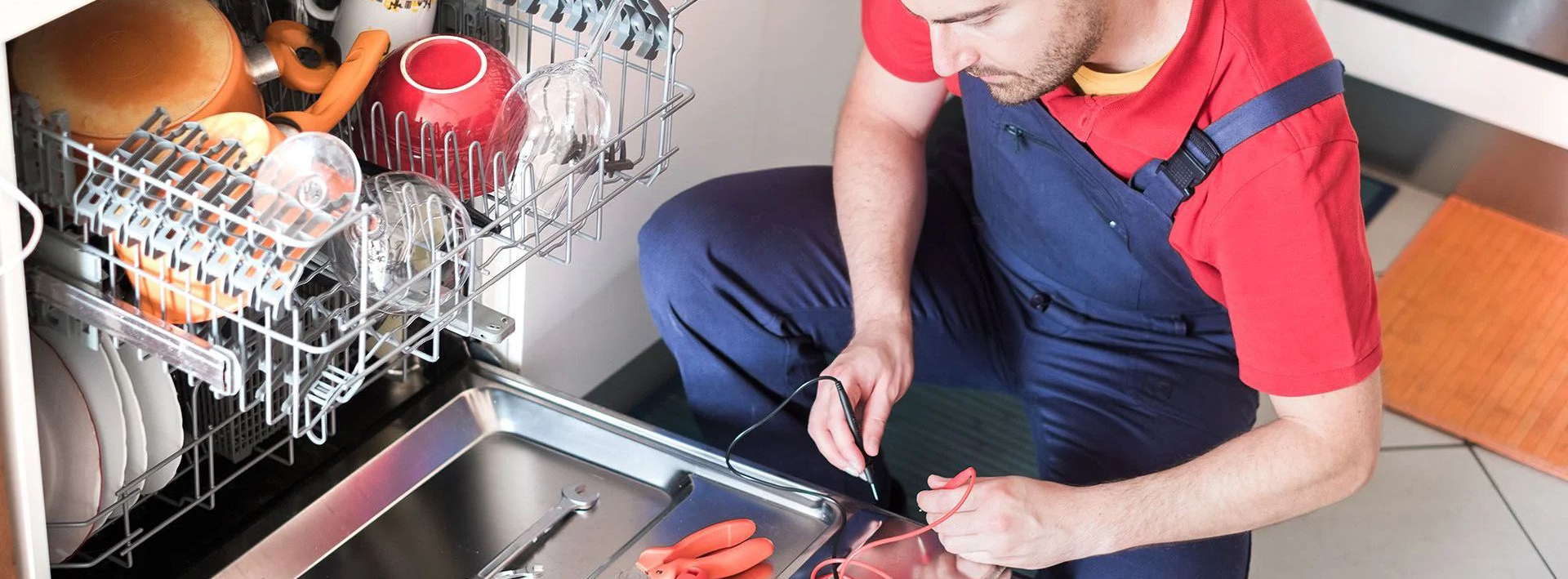
While some people still consider having a dishwasher in their kitchen to be something of a luxury, it’s true that most feel they couldn’t live without these hardworking appliances. So when yours breaks down, and you need to call someone in for dishwasher repair, it can be more than just a minor inconvenience.
For those of us who enjoy regularly preparing meals at home for family and friends, the dishwasher—no matter whether it’s built-in, portable, or a countertop model—is an essential kitchen tool. If you’re reading this, you’re probably wondering whether your dishwasher needs a few minor repairs, or if your problem is bad enough to require a complete dishwasher replacement.
Today’s post gives you seven of the biggest issues your dishwasher may experience. Many of these are cost-effective to repair, though a few—depending on the cause behind the problem—will mean it’s time to purchase a new dishwasher.
As with a leaking clothes washer, there are many potential reasons why your dishwasher is regularly leaking. Among other problems, your leaking dishwasher may have:
A damaged drainage hose
A faulty pump and/or pump seal
A bad door seal (this is likely as dishwashers age since the seals become brittle) Overloading can also be the cause of occasional leaking, so it’s wise to follow your dishwasher manufacturer’s advice on how to load plates, utensils, and larger items like pots and pans. You can also look for information on how to properly load your dishwasher online. This is a subject that many people have opinions about, and there are tons of dishwasher loading tutorials available, believe it or not!
This is another problem that can be caused by overloading your dishwasher, though you may also be using the wrong detergent for your particular dishwasher. This is easy enough to do, as there are lots of different dishwasher detergent formulations for sale—powders, gels, and dissolving tablets.
Check your dishwasher’s manual for more information or visit the manufacturer’s website for help choosing the detergent type that works best with your particular appliance. All the best dishwasher brands should offer support and troubleshooting advice on their websites.
Unfortunately, sometimes more serious problems—like damage to circuitry or electronic control components—can be the cause of your dishes not getting clean. While relatively uncommon, power surges can damage your dishwasher’s electronics, which can prevent cycles from fully running. If your dishwasher has an electronic display of any kind, it may show error codes for incomplete cycles. You’ll need to contact a reliable dishwasher repair resource for help with this kind of problem.
This problem is often due to clogs in the drainage system of your dishwasher. Improper drainage can create huge messes, like damaging leaks and bacterial growth inside and outside of your dishwasher. Some dishwashers have self-serviceable filter components that should be cleaned out regularly to prevent clogging.
However, your dishwasher could also have more significant problems with its drain pump or other components. As we discussed above, damaged circuitry can prevent cycles from running or advancing properly, and that could be the culprit in this case, as well. It’s best to call an appliance expert for help with dishwasher repair due to drainage failure.
If your once whisper-quiet dishwasher has begun making a lot of noise as it operates, there are several potential causes. Sometimes an overloading issue is to blame, as your dishwasher’s spray arms need clearance to turn. Be careful when loading extra-large dishes like serving platters or pasta pots, as they may be getting in the arm or arms’ way.
Unfortunately, excessive noise can also point to a failing pump, bad bearing ring, or damaged spray arm seals. If you’ve tried to troubleshoot this problem on your own and your appliance is still making a lot of noise when it runs, it’s time to seek professional assistance.
A dishwasher that won’t turn on doesn’t necessarily equal a “dead” dishwasher. You could have a simple blown fuse or tripped breaker affecting your dishwasher’s power supply. Check to be sure your dishwasher is receiving the power it needs to run.
Another common issue that will prevent your dishwasher from starting up is a faulty door latch. If your dishwasher can’t close properly—or the electronic control system “thinks” it’s not closing properly—the appliance won’t start.
The typical cause of a smelly dishwasher is food debris built up in the strainer screen or filtration system. Try a dishwasher cleaning solution, which is a special type of detergent you use while running the dishwasher with no dishes loaded to help clean the appliance itself. For a budget-friendly version of this solution, you can also try white vinegar to clean your dishwasher.
If cleaning your dishwasher does not fully solve the odor problem, ensure that it is fully draining, as we discussed above.
Another issue that is sometimes caused by damaged circuitry and cycles that aren’t running or advancing correctly, water fill problems can be tricky to troubleshoot. If your dishwasher is not filling at all—or won’t stop filling as it operates—it could be due to a faulty float or float switch, or a water inlet valve problem, too. And these issues are best addressed by dishwasher repair professionals.
Need Help With Dishwasher Service Repair Call Urhomeclap.
Call Now
24x7 customer support company's team is award wining for best repair service.
We have professional workers for any type of repair service. Call Now!
24x7 customer support provides 100% client satisfication work to their clients.
